INTERVIEW WITH GŪTARA KYŌ
An interview in three languages:
ENGLISH, SPANISH and JAPANESE!
¡Entrevista con GŪTARA KYŌ en tres idiomas: INGLÉS, ESPAÑOL Y JAPONÉS!
In January 2017, GŪTARA KYŌ played their first ever gig in the Helluva Lounge in Kobe, Japan. Intense, gnarly, raw, savage, and catching your eye immediately. Reminding us of two of our all-time favorites — TEENGENERATE and LOS CRUDOS — we knew we had to do a record for GŪTARA KYŌ right away.
Kobe is a shabby, crazy place. None of the members of GŪTARA KYŌ have a turntable, and they barely even listen to music. As an abnormal band that transcends stereotypes, their personality is truly genuine & unique … which is not so easy to come across these days.
Originally released as a CD-only on Japanese label Bakudan, their debut album was recently released internationally on Slovenly as a devastating 10” slab of filth!!
And so, GŪTARA KYŌ’s career begins…
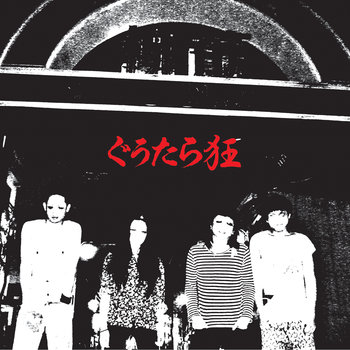
GŪTARA KYŌ “Gutara Kyo” LP by GŪTARA KYŌ
Can you tell me your names and what you do in the band?
Matsumoto Ryo / Vocals
Matsui Jun / Guitar
Yamada Chie / Drums
Nakagawa Jinta / Bass
At the moment the bassist has left the band.
When did Gutara Kyo start?
Matsumoto: I broke up the band I had before GU-TARA-KYO in 2008, then started a new band with Matsui on guitar and me on vocals in June 2009. We had no bassist, only drums, guitar, and vocals.
Did you play guitar when your band was bass-less?
Matsumoto: I played guitar sometimes, but almost just singing. My guitar playing is poor. It was not the same style as Gu-Tara-Kyo.
Is Kobe the bad’s hometown?
Matsumoto: Yes it is.
Are all the members from Kobe?
Matsumoto: All members except for Chan Chie, the drummer, she comes from Akashi.
Can you tell me your discography?
Matsumoto: This 10inch is our first album. We had two demo CD’s before that.
Q6. Which is your favorite band? Do you have some big influential band that gave you the energy to start your own band?
Matsumoto: My favorite band was BLUE HEARTS and GINNAN BOYZ. INU, before start play in the band. I got to know while playing the band.
Chie: The HIGH LOWS and The Pee-z.
Jinta: GAGAGA SP
Matsui: The HIGH LOWS.
When were you listening to these bands?
Matsumoto: I listened to them when I was in High School. But I didn’t look for news sounds anymore.
Chie: I listened to them when I first moved to Kobe. I still love both bands.
Jinta: I was 15 years old when I first listened to them. I went to any shows when I was a High School student.
I feel like Gu-Tara-Kyo has the core sound of your favorite bands. These 3 bands are typical Japanese punk bands. But you have some kind of power to attract world punk lovers. So Slovenly wants to release your sound. Don’t you listen to Punk music from other countries? I find something RAW and psychedelic, kinda like Iggy Pop.
Matsumoto: Gu-Tara-Kyo sound is influenced by the bands I saw at shows, not only from the bands I listen to. I think PUNK and HARDCORE are more than just sound. I don’t know much about overseas bands, sorry.
Jinta: I listen to almost only Japanese bands and sometimes overseas bands like Dead Kennedys [Live at the Deaf Club]
Do you listen to contemporary bands?
Matsumoto: I basically don’t listen to music, but sometimes I go to some shows.
Chie: Not particularly.
Jinta: GINNANG BOYZ.
Gu-Tara-Kyo released a 10inch vinyl record, but you and your friends have no turntables. I wonder about it. Don’t you usually buy vinyl records?
Matsumoto: No, I don’t buy vinyl records.
Chie: I don’t buy vinyl records at all.
Jinta: I have never bought a vinyl record.
So how do you buy to music? CD or digital?
Matsumoto: I often buy the CD. I have no PC so I don’t buy digital.
Chie: I’d rather buy the CD.
Jinta: CD.
Do you ever go to record stores?
Matsumoto: No, I don’t go to record stores. I buy the CDs at the shows.
Chie: I only go to record stores when I really want to have the CD.
Jinta: I go to second-hand CD stores.
Have you ever listened to music from an analog record as a child?
Matsumoto: No.
Chie: No, my family is particular about music.
Jinta: I don’t remember doing it but perhaps indirectly from my father.
When you listen to music, do you use a CD player, a smartphone or something else?
Matsumoto: I don’t listen to much music, but mostly on a CD player. My phone never had a song on it.
Chie: CD and often with an app on the phone.
Jinta: I use a CD player and the smartphone too.
Is it fun to play with your band in Kobe?
Matsumoto: There are many good bands in Kobe.
Chie: I never thought about it. I enjoy playing with the band, no matter where.
Jinta: I wouldn’t say fun. I want to experience the same as when I was a teenager and went to shows in Kobe.
You don’t normally listen to music, Do you have other elements of expression that influence the band apart from music?
Matsumoto: I’m not sure. My favorite things, like Cartoons, Books, Mahjong… I don’t think that PUNK is just only about music. It’s difficult to define what concretely punk is. I don’t listen to music usually but I like to go to the shows.
Chie: I work, so playing in shows has become a stress reliever.I can’t having fun with on TV music.I used listen music very well formerly .It might also changing life and timings i listen music much or not.
How did you learn to play drums?
Chie: I started playing drums with my first band. I didn’t learn much, so I practiced with a books.
Who is your favorite drummer?
Chie: Pika of AFURIRANPO
Who is your favorite bassist?
Jinta: OOKI Haruyuki (The Pee z)
I found interesting that the release of the record is in an analog format coming from an overseas record label when the band members themselves don’t even have a record player . How do you feel about this?
Matsumoto: I’m glad with our record album released from an overseas label. However, we are thinking that the most important is live music at the shows. I feel glad we have chances to play overseas more than releasing analog records.
Jinta: I’m glad to expand for people to listen to GUTARA KYO’s sound, no matter what format analog or digital or country.
You don’t listen to music everyday from analog records. Haven’t you got interest in analog records? Don’t you want to buy a turntable if the price is the same in analog records and CD?
Jinta: I have interest in analog records, but i have no space in my tiny room now. I will buy a turntable If I can move to a bigger room.
Matsumoto: I have experience listening to music from analog records, the sound is good. However, I don’t listen to music much in my room. It is so simple and easy to buy CD in Japan, so I rather buy CD. I’m more interested in our band release than the format of the release. But it is be difficult to have a image of how having an analog record would be .The Japanese bands don’t release analog records much.
There was little damage by my neighborhood. I was in elementary school first grader when Kobe earthquake. I thought lucky to closes the school that time. Adults were serious, I appreciate adults who did not make children so hard at that time.
Matsumoto: I was in elementary school fourth grader when Kobe earthquake. I’ve had almost no opportunity to have experience listening to music by analog records. My family does’t listen to music, there were no analog records or CDs in my house. I listen to the analog record of Japanese old blues ENKA in the house of my relatives. I live in part of north side of Kobe. There was almost no damaged area. I remember my house got a little crack and the water service stopped few days, but it was fix soon.
INTERVIEW BY Rin Ishioka (Slovenly Japan) in Oct 2017
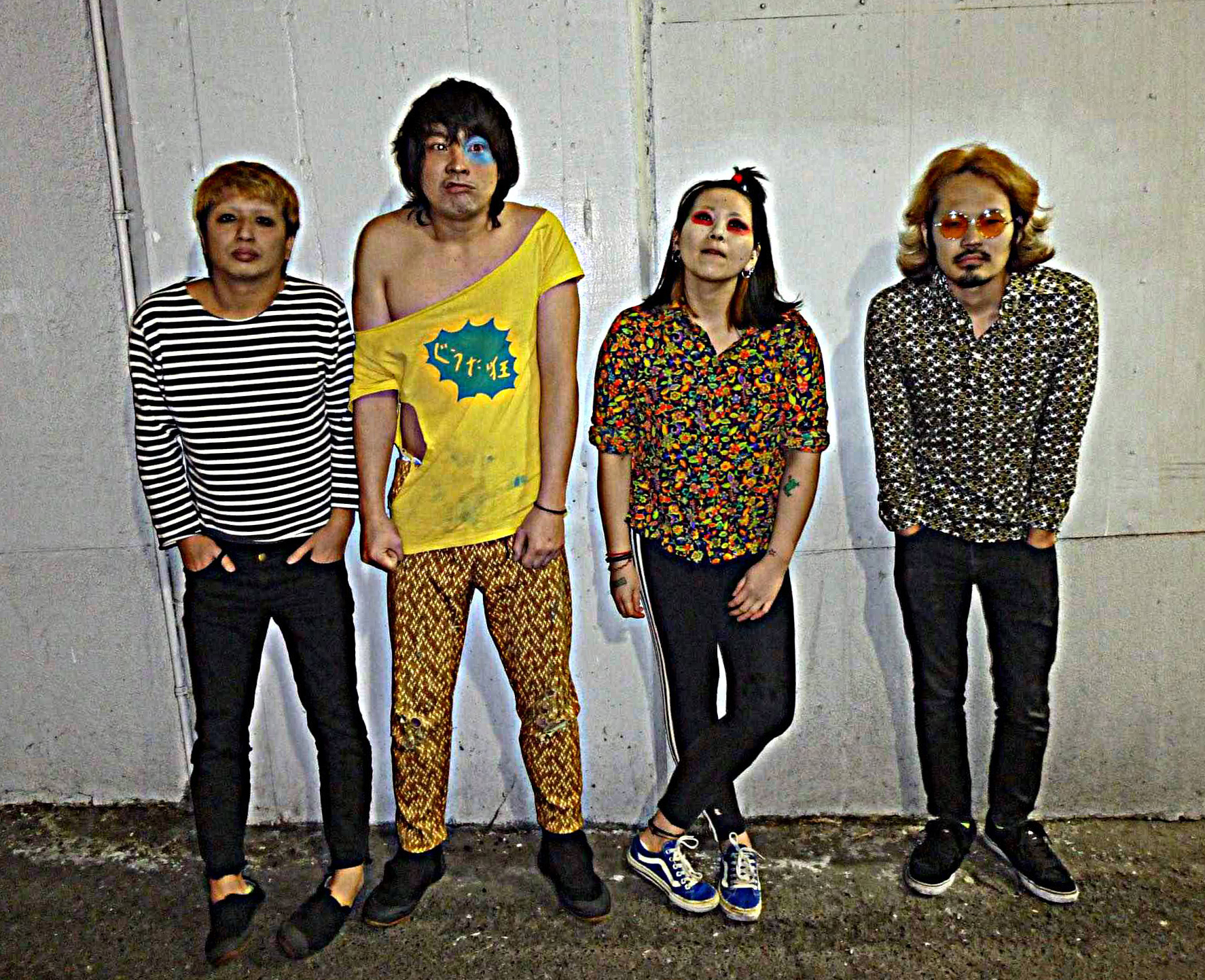
ENTREVISTA CON
GŪTARA KYŌ
En enero de 2017 los GŪTARA KYŌ daban el primer concierto en el Helluva Lounge de Kobe, Japón. Una banda que llama la atención desde el primer segundo. Intensos, cafres, crudos y bestias. A medias entre Teengenerate y Los Crudos, GŪTARA KYŌ pasaban directamente a formar parte de la familia Slovenly Recordings.
Ninguno de los miembros tiene tocadiscos, no escuchan mucha música. Kobe es lugar cutre, muy loco. Una banda sin estereotipos, anormal en el buen sentido, lo que les otorga un toque de personalidad propio difícil de conseguir hoy en día.
Ahora debutan en Slovenly Recordings con un album en formato 10″.
Así comienza la carrera de GŪTARA KYŌ.
Os dejamos con la entrevista que dedicaron a Slovenly Recordings para que conozcáis un poco más sobre ellos.

GŪTARA KYŌ “Gutara Kyo” LP by GŪTARA KYŌ
Q1. ¿Me decís vuestros nombres y qué hacéis en la banda?
voz / Matsumoto Ryo
guitarra / Matsui Jun
batería / Yamada Chie
bajo / Nakagawa Jinta
y por ahora, el bajista ha dejado la banda.
Q.2 ¿Cuándo montasteis Gu-Tara-Kyo?
Matsumoto: Disolví la banda que tenía antes de GU-TARA-KYO en 2008, entonces monté una nueva banda con Matsui a la guitarra y yo cantando, en Junio de 2009. No teníamos bajista, sólo batería, guitarra y voz.
Q.2-1 ¿Tocabas la guitarra cuando tu grupo no tenía bajo?
Q-2 Matsumoto: Algunas veces, no toco muy bien así que a veces tocaba un poco al principio del bolo y luego la dejaba. Ahora tocamos de otra manera; metí a un bajista porque así el guitarra tiene más libertad para tocar.
Q.3 ¿Es la banda de Kobe?
Matsumoto: Sí, es de Kobe
Q.4 ¿Todos los miembros viven y nacieron en Kobe?
Matsumoto: Sí, todos son de Kobe, menos la batería Chan Chie que es de Akashi.
Q.5 ¿Cuál es vuestra discografía?
Matsumoto: Este 10 pulgadas es nuestro primer álbum. Antes de eso, teníamos un par de demos en CD-R.
Q.6 ¿Cuál es tu banda favorita? ¿Hay alguna banda que te haya influído especialmente y dado la energía para montar la tuya?
Matsumoto: Mis bandas favoritas eran BLUE HEARTS y GINGNANG BOYZ y INU.
Chie: The HIGH LOW’s y The Pee-z
Jinta: GAGAGA SP
Matsui: The HIGH LOW’s
Q 6.1 ¿Cuándo escuchabais esas bandas?
Matsumoto: Las escuchaba cuando iba al instituto.
Chie: Las escuchaba en la época en que me mudé a Kobe. Aún me encantan.
Jinta: Tenía 15 años la primera vez que los oí. Iba a todos sus bolos cuando estaba en el instituto.
Q 6.2 Creo que el sonido de Gu-Tara-Kyo conserva la esencia de vuestras bandas favoritas. Éstas tres bandas son típico punk japonés. Pero tenéis un magnetismo que atrae a amantes del punk de todo el mundo. Por eso Slovenly quiere editar vuestro sonido. ¿Escucháis música punk de otros países? A mí me transmite algo CRUDO y psicodélico, como un rollo Iggy Pop.
Matsumoto: El sonido de Gu-Tara-Kyo está influenciado por las bandas que veo en directo, no sólo por las bandas que escucho. Creo que el PUNK y el HARDCORE son algo más que un sonido. No tengo mucha idea sobre las bandas de otros países, lo siento.
Jinta: Yo escucho casi exclusivamente bandas japonesas pero a veces bandas extrangeras como Dead Kennedys [Live at the Deaf Club]
Q. 7 ¿Escucháis grupos contemporáneos?
Matsumoto: Yo básicamente no escucho música, pero a veces voy a conciertos.
Chie: No particularmente.
Jinta: GINNANG BOYZ.
Q. 8 Gu Tara Kyo han sacado un vinilo de 10 pulgadas pero ni vosotro ni vuestros amigos tenéis tocadiscos. Me parece extraño. ¿No soléis comprar discos en vinilo?
Matsumoto: No, yo no compro vinilos.
Chie: Yo no compro discos en vinilo en absoluto.
Jinta: Nunca he comprado uno de esos discos.
Q. 9 ¿Entonces cómo escucháis música, en CD o en formato digital?
Matsumoto: Yo suelo comprar CDs, no tengo PC así que no uso formatos digitales.
Chie: Prefiero comprar el CD.
Jinta: CD.
Q. 10 ¿Nunca vais a tiendas de discos?
Matsumoto: No, yo no voy a tiendas de discos. Compro los CDs en los conciertos.
Chie: Yo solamente voy si de verdad quiero tener el CD.
Jinta: Yo suelo ir a tiendas de CDs de segunda mano.
Q. 11 ¿Alguna vez habéis escuchado música en formato analógico cuando erais niños?
Matsumoto: No
Chie: No, a mi familia no le iba mucho la música.
Jinta: No que yo recuerde, pero quizás de forma indirecta a través de mi padre.
Q 12. ¿Cuando escucháis música, utilizáis un reproductor de CDs, un smartphone o alguna otra cosa?
Matsumoto: No escucho mucha música, pero normalmente uso un reproductor de CDs. Nunca he tenido una canción en mi teléfono.
Jinta: Yo uso un reproductor de CDs y un smartphone.
Q 13. ¿Es divertido hacer bolos en Kobe?
Matsumoto: Hay muchas bandas buenas en Kobe.
Chie: Nunca me he parado a pensarlo. Me gusta tocar con la banda, me da igual dónde.
Jinta: Yo no diría divertido. Quiero sentir lo mismo que sentía cuando era un adolescente e iba a conciertos en Kobe.
Q 14. Si normalmente no escucháis mucha música, ¿tenéis otras formas de expresión que influencien a la banda, aparte de la música?
Matsumoto: No estoy seguro. Mis cosas favoritas son dibujos animados, libros, mahjong… No creo que el PUNK se base sólamente en la música. Es difícil definir qué es el punk en concreto. No escucho mucha música pero me gusta ir a los conciertos.
Chie: Yo trabajo, así que hacer bolos es un poco mi válvula de escape.
Q 15. ¿Cómo aprendiste a tocar la batería?
Chie: Empecé a tocar la batería con mi primera banda. No aprendí mucho, así que empecé a practicar con un profesor y con libros.
Q 16. ¿Cuál es tu batería favorito?
Chie: Pika de AFURIRANPO.
¿Cuál es tu bajista favorito?
Jinta: OOKI Haruyuki (The Pee z).
Q17 Encontré interesante que el lanzamiento del disco esté en un formato analógico proveniente de una discográfica extranjera cuando la banda no usa este tipo de formato y ni siquiera tiene un reproductor de discos. ¿Qué os parece esto? Espero que estéis contentos con eso.
Matsumoto: Me parece genial que lance nuestro disco un sello extranjero. Sin embargo, pensamos que lo más importante son los conciertos en directo. Me hace más feliz tener la oportunidad de tocar en el extranjero que editar en analógico.
Jinta: Yo me alegro de expandirme para la gente escuche el sonido de GUTARA KYO, sin importar si el formato es analógico, digital o el país.
Q18. Todos los días no escucháis música en analógico. ¿No os interesan los registros analógicos? ¿No compraríais un tocadiscos si el precio es el mismo en analógico que en Cd?
Jinta: Por supuesto, pero no tengo espacio en mi pequeña habitación. Compraré un tocadiscos si me mudo de casa.
Matsumoto: He escuchado música de discos en analógico, y el sonido es bueno. Sin embargo, no escucho mucha música en mi habitación. En Japón es muy sencillo y fácil comprar un Cd. Me interesa más el lanzamiento del disco que el formato. Es difícil de imaginar cómo sería en analógico. Las bandas japonesas no sacan muchos discos en analógico.
Q 19. Estoy sorprendida con el cambio del sonido analógico en los últimos años. Cuando era joven y tocaba en la escuela era con discos de vinilo. En clase de música se escuchaba música clásica en el analógico. ¿Significa eso que la mayoría de la gente está remplazando sus tocadiscos por reproductores de Cd? ¿Podría ser efecto del terremoto de Kobe? Tal vez hubiese sido complicado abrir una tienda de segunda mano después del terremoto ¿Has oído hablar de cosas como esas?
Jinta: Cuando yo estaba en primaria, la era ya había cambiado y todo estaba en CD. En Kobe hay relativamente bastantes tiendas de vinilos. Creo que esta cultura musical floreció hace tiempo en el puerto de la ciudad. Muchas cosas han cambiado debido al desastre de la ciudad tras el terremoto de hace 10 años, es tremendo.
Por mi vecindario hubo poco daño. Cursaba el primer grado de primaria cuando el terremoto de Kobe. Me sentí con suerte el día que cerraron la escuela. Los adultos hablaban en serio. Les agradezco que se lo hicieran fácil a los niños.
Matsumoto: Estaba en cuarto grado de primaria cuando el terremoto de Kobe. Casi no he tenido la oportunidad de escuchar discos de vinilo. Mi familia no escucha música. No hay discos de vinilo ni en Cd en mi casa. Escucho discos viejos en vinilo de música japonesa Enka en casa de mis parientes. Vivo en la parte norte de Kobe. Recuerdo que mi casa se rompió un poco y el servició de agua se suspendió unos días, pero lo arreglaron pronto.
ENTREVISTA POR Rin Ishioka (Slovenly Japon) Oct 2017

GŪTARA KYŌ
2017年1月にAVENUE Zツアーで神戸のヘラバラウンジでライブをしたときに1バンド目で出たのがぐうたら狂だった。私は会場に着いたものの、大阪に忘れ物を取りに帰ったりでぐったりしてて、ライブをあまり見ていなかったんだけど、お客さんの目やAVENUE Zのメンバーが目をキラキラさせていた印象があった。
ツアーの後、Slovenly社長がぐうたら狂に送っていたメールの返信をいきなりグーグル翻訳ロボがメールを読み上げその返信として「イシオカリンがスグニオデンワシマス」と言った。Slovenly Recordings にほうれんそうは生えていない。
その後、世界デビューに向けてぐうたら狂とのやりとりが順調に進む中で、ぐうたら狂に対する疑問とか興味が湧いたのと、基本的なバンドの紹介もあったほうが良いし、宣伝広告に使うという名目でインタビューをしてみました。
東京と地方の差とか年代の差がなんとなく見えてくるやりとりで面白いなぁ~と思っております。
メンバー全員レコードプレーヤー持っていません、音楽あんまり聴きません、神戸の猛獣ぐうたら狂。世界デビューのはじまりです。
ぐうたら狂インタビュー

GŪTARA KYŌ “Gutara Kyo” LP by GŪTARA KYŌ
Q1.各メンバーのお名前と担当楽器を教えてください。
松本亮(歌)
松居潤(ギター)
ちゃんちえ(ドラム)
中川仁太(ベース)
が現在のメンバーです。ファーストアルバムの時は、ベースメンバーが違います。
Q2.いつ頃、どんな感じでぐうたら狂が始まったのか教えてください。
2008年に前にやっていたバンドが解散して、2009年に松本亮と松居潤の2人で結成しました。当初はベースレスで、ドラムはサポートメンバーで活動していました。
Q2-1ベースレスの時は、松本さんもギター弾いてましたか?それとも、ギター1本とドラムとボーカル?
Q-2. 僕もたまにギター弾いたりしていましたが殆どボーカルとギター1本とドラムです。僕はギターヘタクソですし、弾いててもすぐに放っちゃうんですよ。ぐうたら狂の始めは今のような感じじゃなかったですね。ベースを入れたのはギターの松居潤が好き勝手にできるようにと思ってです。
Q3.活動拠点は主に神戸?
はい。神戸です。
Q4.メンバーは皆、神戸出身、神戸在住?
全員神戸在住です。出身はちゃんちえだけ明石であとは全員神戸です。
Q5.ディスコグラフィーを教えてください。
今回アナログ化されたものがファーストアルバムですが、それまでに2回CD-Rでデモ音源を作っています。
Q6.好きなバンド、自分がバンドを始めるようになったきっかけになるようなバンドの存 在があるなら教えてください。
Matsumoto:自分がバンドを始める前に好きだったバンドはブルーハーツや銀杏BOYZやINUです。バンドを始めてからいろいろなバンドを知って好きになりました。
Chie:ザ・ハイロウズ、THE ピーズです
Jinta:ガガガSPです。
Matsui:The HIGH LOW’s
Q6-1 ブルーハーツ、銀杏BOYZ、INUこの3バンドは何時頃良く効いてましたか?(中学の頃とか?)
Matsumoto:中学生、高校生の頃によく聞いてました。でもそこから掘り下げてってとこまではしなかったですね。
Chie.どちらもよく聴いたのが自分が神戸に出てきた頃で、今も大好きです
Jinta:初めて聴いたのは15歳で、高校生の時はよくライブに行っていました。
Q6-2 この3バンドがぐうたら狂の音の骨組みになってるのはよくわかる気がします。3バンド共に日本語で歌う代表的なパンクバンドですが、ぐうたら狂の音はかなりパワーがあって言語を超えたものがあるから今回,Slovenlyからのリリースが決まったと思うのですが、洋楽?例えばイギーポップのRAWの感じとかサイケデリックな音の要素も感じる。日本語以外のバンド、洋楽と呼ばれるようなバンドは聞いたりはしなかった?
Matsumoto:ぐうたら狂の音に影響を与えてるのは音源で聞いていたバンドじゃなくてライブを見たバンドだと思います。パンクやハードコアのような音楽は音源以上にライブに魅力があると思います。洋楽のことは恥ずかしいぐらいに何も知らないです。
Jinta:殆ど邦楽ばっかりですが、時々洋楽も聞きます。
よく聴くのはDead Kennedysの「Live at the Deaf Club」
Q7.最近良く聞いている音楽を教えてください。
Matsumoto:もともとあまり音楽を聞かないんですが、ライブを見てかっこよかったバンドの音源は買って聞きます。
Chie:特にないです
Jinta:銀杏BOYZ。最近30歳になって、10代で影響受けた音楽を聴きなおしてます。
Q8.今回、Slovenlyからアナログの10インチをリリースする事なったのですが、こないだ電話で友人含めレコードプレーヤー持っている人がほとんどいない?ようで、私はすごく興味深いと感じました。普段のアナログレコードを買う事はほとんど無いですか?
※アナログレコードが強いみたいな話ではないです。
Matsumoto:そうですね。僕はアナログレコードを買うことは殆どないです。
Chie:全くといえるほどないです
Jinta:買ったこと無いです。
Q9.音源はCDで買う事が多いですか?それともデジタル?
Matsumoto:音源はCDで買うことが多いです。パソコンも持ってないのでデジタルデータで買うことはないです。
Chie:買うならCDです
Jinta:CDです。
Q10.普段の生活で、CDショップやレコード屋に行くことはありますか?
Matsumoto:CDショップやレコードショップも殆ど行かないですね。音源を買うのはライブの物販ブースばっかりです。
Chie:よっぽど欲しいCDがあるとき以外は行きません
Jinta:あります。殆ど中古ショップですが。
Q11.子供の頃にアナログレコードで音楽を聴いた経験はありますか?
Matsumoto:ないです。
Chie:ないですね、特別音楽が好きとかこだわりがあるみたいな家族ではなかったので
Jinta:記憶には無いですが、父が聴いてたのを間接的に聴いていたかも。
Q12.普段の生活で音楽を聴くときは、CDから?iPhone?それ以外?それ以外なら、それが何か教えてください。
Matsumoto:あまり聞かないんですが、CDプレーヤーで聞くことが殆どです。iPhoneには一曲も入ってないです。
Chie:CDか、iPhoneのクリップボックスというアプリをよく使います
Jinta:CDからです。スマートフォンで聴くこともあります。
Q13.神戸で活動してて、楽しいこと教えてください。
Matsumoto:かっこいいバンドがいっぱいいるところです。
Chie.考えたことがなかったですバンド自体が楽しいので、活動場所はそんなに関係ないかも
Jinta:楽しいというよりも、自分が客としてライブハウスに行っていた10代の時に体験した神戸のシーンを演者として体験したいという気持ちで神戸でやっています。まだそれは叶っていないので悔しさもあります。
Q14.ふだんあまり音楽を聴かないとの事ですが、バンドの表現につながっている要素って音楽以外にもあるという事なのかな?
※興味があるのは、影響を受けている3バンドは確かに音だけではない部分もバンドの大きな要素になっているけど、INUに関しては勉強不足だけど、ブルーハーツ、銀杏BOYZに関してはかなり音楽を聞き込んでいる人が音楽を製作していて、レコードもかなり収集しているバンドです。音楽の深いリスナーでもあり、表現者でもある。私の年齢ぐらいの人(40歳)だと、音楽リスナーからバンドを始める姿勢が通常なのかな?という古い感覚があるんだけど、それ以外のバンドにつながる要素がぐうたら狂にあるんじゃないかと感じての質問です。
Matsumoto:影響を受けてるかどうかはわかりませんが、僕がバンドの他に好きなことは、漫画と本と麻雀です。表現と刺激が好きなんですかね。
それと僕はパンクって音楽のジャンルの1つって感覚がないです。具体的に何がパンクなのか答えるのは難しいですが。
普段音楽を聞かないって言ってもいろんなバンドのライブを見るのは好きですよ。
Chie:ライブの日以外はだいたい仕事なのでストレス発散的な感じもあるし、あとテレビに出てる人たちの音楽が面白くないのが多いな~っていう感じで
前はよく聴いててCDも持ってるんですけど、まあ環境とタイミングもありますよね
Q15,ドラムはどうやって覚えたのですか?独学ですか?それともどこかに習いに行ってましたか?
Chie:初めて組んだバンドでドラムを始めたんですけど、習いに行ったり教則本買って家で練習とかはしたことないです
Q16,好きなドラムプレイヤーは?
Chie:あふりらんぽのピカさんです
Q16,好きなどらむベースプレイヤーは?
Jinta:大木温之(Theピーズ)
Q17 最初のインタビューを受けて、面白いなと感じたのは、”アナログレコードで音楽を聴いたりしてこなかったバンドがいきなり海外のパンクレーベルからアナログレコードで音源を出すことになった”っていう事なんだけど、音源が海外から出ることは喜んでもらってると信じたい(笑)ぐうたら狂のみなさんはどう感じてる?
Jinta:媒体や国関係なくぐうたら狂の音楽に触れる人が増えることは嬉しいです。
Matsumoto:海外で発売されることは嬉しいです。ただ今までの活動のスタンスが何よりもライブに重点を置いていたので、正直に言うとアメリカやヨーロッパでライブわする可能性が出来たことのほうが嬉しいです。
Q18 アナログレコードは普段の生活に登場してないよね?興味は持てる?CDとアナログが同じ値段なら、プレーヤー買ってもアナログで!みたいな感覚はある?
Jinta:興味はあります。家が狭くて置ける場所が無いです。広い家に住んだら買います。
Matsumoto:アナログレコードで音楽を聴いたことがないわけではないので、アナログレコードの音の良さは知っています。ただ、もともと家で音楽を聴くこと自体があまり無いので手軽なCDを買うような気がします。アナログレコードのリリースが決まった今の段階で前より興味は確実にありますが。それと僕の知っている中では日本ではアナログレコードで音源を出しているバンドが少ないと思うので想像しにくいです。
Q19 アナログレコードの経験が10年の差でこんなに違うのか???私は、小さい頃は運動会の音楽はレコードだったし、中学生ぐらいまで音楽の授業でアナログレコードでクラッシックを聞いたりという経験してたから、そんなにオーディオ買い換えてるのか?!と疑問に思ったけど、震災があったんだなと。気が付きました。
住宅や学校も被災してるなら、その頃オーディオはCDに全部買い替えるだろうし、ましてや中古レコード屋さんが震災後に復活するのははなかなか難しい事だったのかもしれない。そおいう話は聞いたことある?
Jinta:震災は関係ないです。自分が小学生の時には時代が完全にCDに切り替わってました。
神戸は比較的中古アナログレコードショップは多いですよ。港町で昔から音楽の文化が栄えていたからだと思います。
震災で神戸の町が失ったものは10年ぐらいで殆ど取り戻してました。凄いです。
Matsumoto:震災の時僕は小学校4年生だったんですが、それ以前からアナログレコードに触れる機会は殆どなかったと思います。音楽を聴く家族じゃなかったので、自分の家には一枚もなかったし(CDも)親戚の家で演歌のアナログレコードを聞いたことがあるぐらいです。
僕は神戸市ですが、北区だったので被害があまりない地域でした。家に少しヒビが入った程度です。水道が何日か止まったような記憶がありますがすぐに復旧したと思います。
Q20 答えたくなければ回答なしで構わないんだけど、神戸の震災での経験を聞かせてもらえる?
Jinta
自分の身近はわりと被害が少なかったです。
自分自身小学1年生だったので、学校が休みになって嬉しいぐらいでした。
大変だったのは大人達で、当時僕たち子供に辛い思いをさせなかった大人に感謝しています。
INTERVIEW BY Rin Ishioka (Slovenly Japan) in Oct 2017

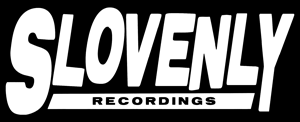


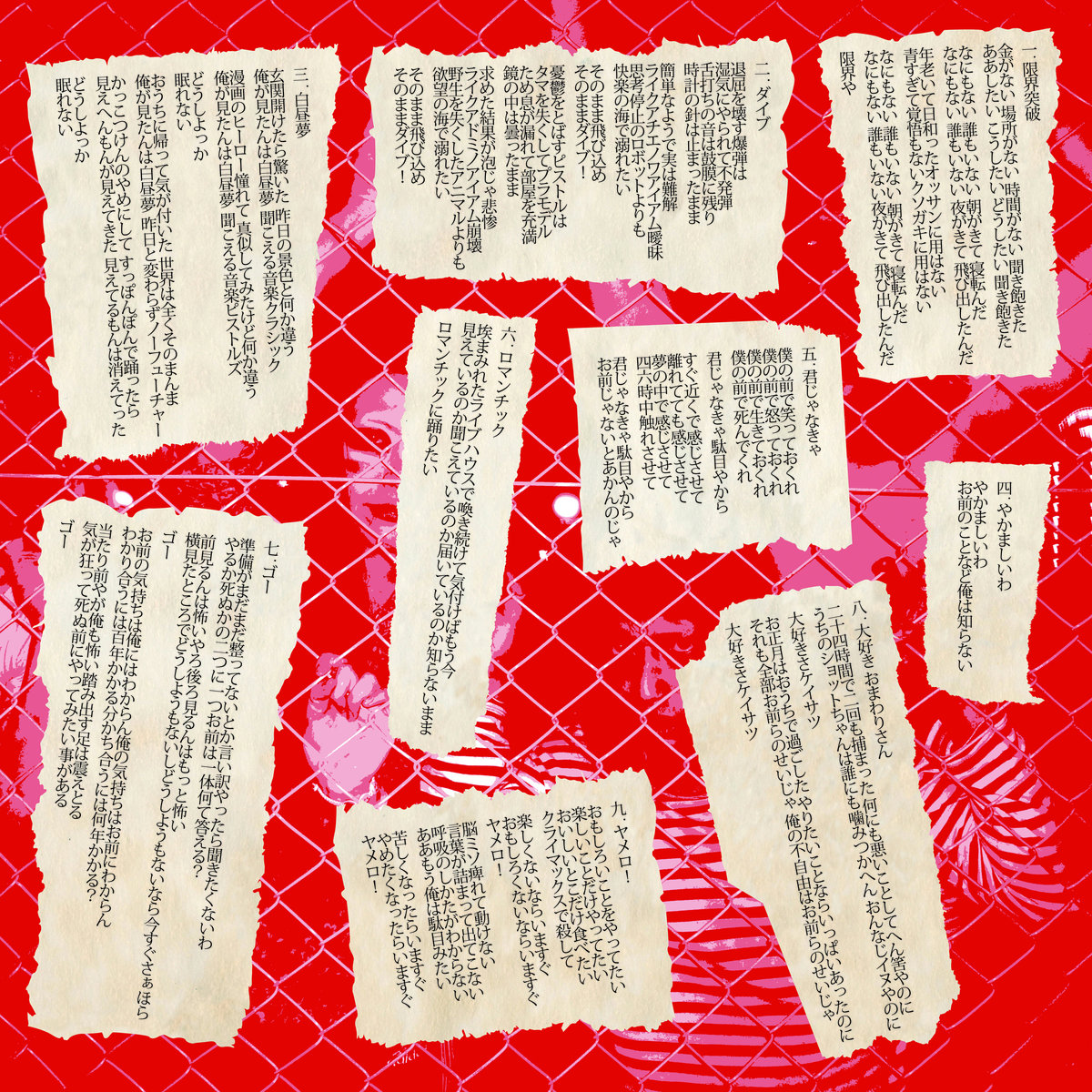
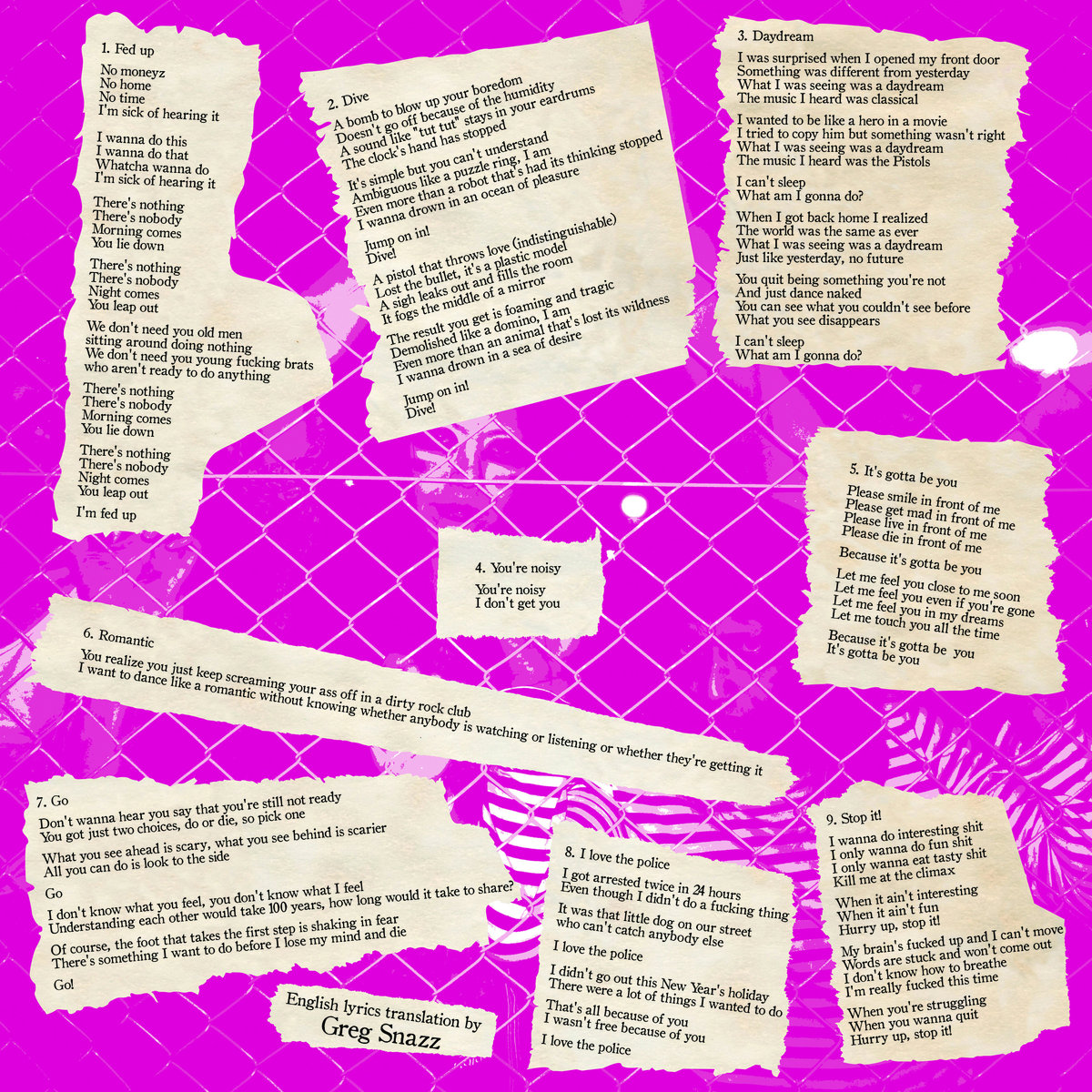
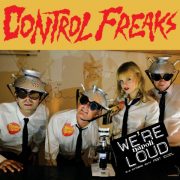
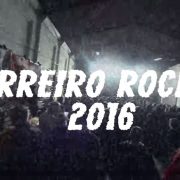
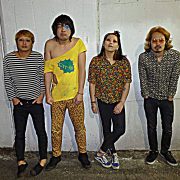
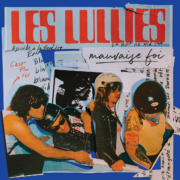
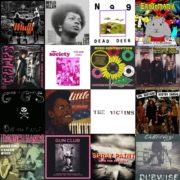
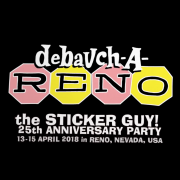


Leave a Reply
Want to join the discussion?Feel free to contribute!